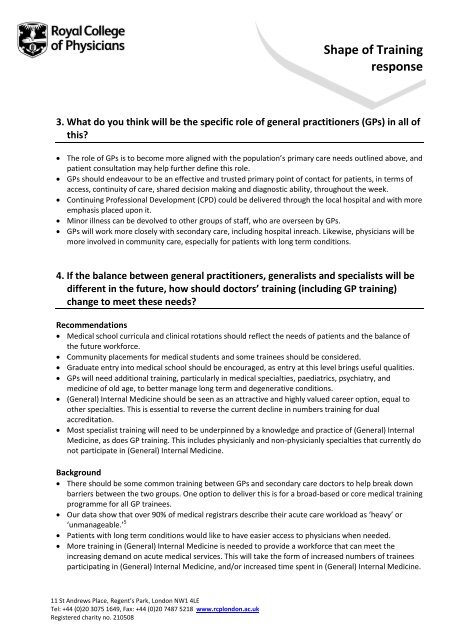Dr Andrew Hilson FRCP - Royal College of Physicians
Dr Andrew Hilson FRCP - Royal College of Physicians
Dr Andrew Hilson FRCP - Royal College of Physicians
You also want an ePaper? Increase the reach of your titles
YUMPU automatically turns print PDFs into web optimized ePapers that Google loves.
Shape <strong>of</strong> Trainingresponse3. What do you think will be the specific role <strong>of</strong> general practitioners (GPs) in all <strong>of</strong>this? The role <strong>of</strong> GPs is to become more aligned with the population’s primary care needs outlined above, andpatient consultation may help further define this role. GPs should endeavour to be an effective and trusted primary point <strong>of</strong> contact for patients, in terms <strong>of</strong>access, continuity <strong>of</strong> care, shared decision making and diagnostic ability, throughout the week. Continuing Pr<strong>of</strong>essional Development (CPD) could be delivered through the local hospital and with moreemphasis placed upon it. Minor illness can be devolved to other groups <strong>of</strong> staff, who are overseen by GPs. GPs will work more closely with secondary care, including hospital inreach. Likewise, physicians will bemore involved in community care, especially for patients with long term conditions.4. If the balance between general practitioners, generalists and specialists will bedifferent in the future, how should doctors’ training (including GP training)change to meet these needs?Recommendations Medical school curricula and clinical rotations should reflect the needs <strong>of</strong> patients and the balance <strong>of</strong>the future workforce. Community placements for medical students and some trainees should be considered. Graduate entry into medical school should be encouraged, as entry at this level brings useful qualities. GPs will need additional training, particularly in medical specialties, paediatrics, psychiatry, andmedicine <strong>of</strong> old age, to better manage long term and degenerative conditions. (General) Internal Medicine should be seen as an attractive and highly valued career option, equal toother specialties. This is essential to reverse the current decline in numbers training for dualaccreditation. Most specialist training will need to be underpinned by a knowledge and practice <strong>of</strong> (General) InternalMedicine, as does GP training. This includes physicianly and non-physicianly specialties that currently donot participate in (General) Internal Medicine.Background There should be some common training between GPs and secondary care doctors to help break downbarriers between the two groups. One option to deliver this is for a broad-based or core medical trainingprogramme for all GP trainees. Our data show that over 90% <strong>of</strong> medical registrars describe their acute care workload as ‘heavy’ or‘unmanageable.’ 5 Patients with long term conditions would like to have easier access to physicians when needed. More training in (General) Internal Medicine is needed to provide a workforce that can meet theincreasing demand on acute medical services. This will take the form <strong>of</strong> increased numbers <strong>of</strong> traineesparticipating in (General) Internal Medicine, and/or increased time spent in (General) Internal Medicine.11 St <strong>Andrew</strong>s Place, Regent’s Park, London NW1 4LETel: +44 (0)20 3075 1649, Fax: +44 (0)20 7487 5218 www.rcplondon.ac.ukRegistered charity no. 210508

















